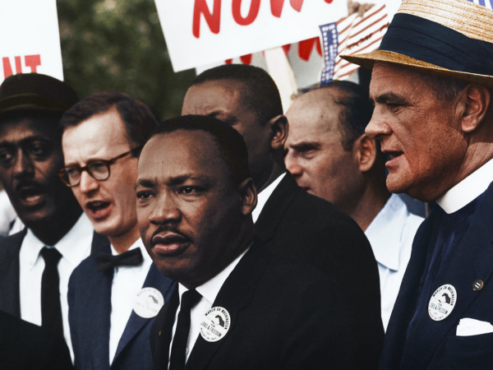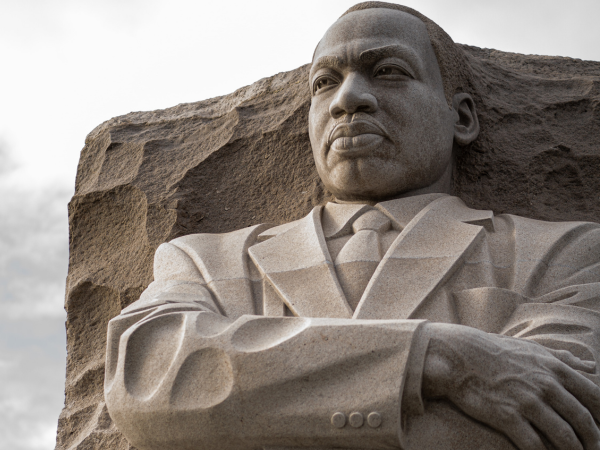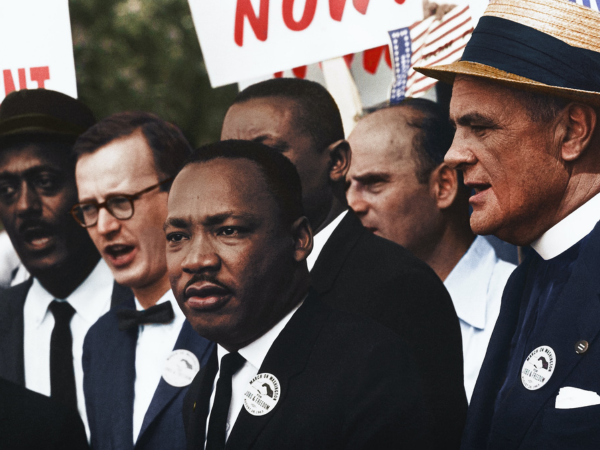Most people associate Dr. Martin Luther King, Jr. with civil rights for African Americans. In fact, Dr. King’s ministry addressed all seven of the themes of Catholic Social Teaching framed by the U.S. Conference of Catholic Bishops (USCCB).

MLK IN THE MARCH ON WASHINGTON FOR JOBS AND FREEDOM, IN WASHINGTON, D.C. ON WEDNESDAY, AUG. 28, 1963. THE PURPOSE OF THE MARCH WAS TO ADVOCATE FOR THE CIVIL AND ECONOMIC RIGHTS OF AFRICAN AMERICANS. PHOTO BY HISTORY IN HD ON UNSPLASH
Below are some of his statements about five of the seven themes.
LIFE AND DIGNITY OF THE HUMAN PERSON
According to the USCCB, “The Catholic Church proclaims that human life is sacred and that the dignity of the human person is the foundation of a moral vision for society.”
Dr. King, likewise, set the dignity of the human person as the foundation of his work and teaching. In his 1967 book “Where Do We Go from Here: Chaos or Community,” Dr. King declared: “The image of God is universally shared in equal portions by all men. There is no graded scale of essential worth. Every human being has etched in his personality the indelible stamp of the Creator. Every man must be respected because God loves him. The worth of an individual does not lie in the measure of his intellect, his racial origin or his social position. Human worth lies in relatedness to God. An individual has value because he has value to God. Whenever this is recognized, ‘whiteness’ and ‘blackness’ pass away as determinants in a relationship and ‘son’ and ‘brother’ are substituted.”
CALL TO FAMILY, COMMUNITY AND PARTICIPATION
The bishops say, “The person is not only sacred but also social.” They call marriage and the family “the central social institutions,” and they add that how we organize our society through politics, economics, law, and policy affects every human’s dignity.
From the moment Dr. King and his colleagues began working to integrate lunch counters, they were addressing the ways we organize society. They understood that laws, policies, politics, and economic practices needed to change so that African Americans could be treated with dignity. At the same time, Dr. King saw the family as crucial. In “Where Do We Go from Here,” for example, he talks about the need to strengthen Black families who struggle under a history of housing and job discrimination, as well as underfunded schools and high levels of incarceration.
He wrote, “This is doubly tragic, because nothing is so much needed as a secure family life for a people seeking to rise out of poverty and backwardness. History continues to mock the Negro today, because just as he needs ever greater family integrity, severe strains are assailing family life in the white community.”
DIGNITY OF WORK AND RIGHTS OF WORKERS
The bishops say, “The economy must serve people, not the other way around.” Dr. King agreed. He spoke not just of Black workers, but all workers, in his 1968 speech “All Labor Has Dignity,” he said: “All labor that uplifts humanity has dignity and importance and should be undertaken with painstaking excellence.”
And in “The Other America” (1967) he spoke about the difficulties of getting jobs to people—White, Hispanic, Black, Native American—who grow up with poverty and substandard schools. “[I]t’s much easier to integrate a lunch counter than it is to guarantee a livable income and a good, solid job.”
OPTIONS FOR THE POOR AND VULNERABLE
Again, in “Where Do We Go from Here,” Dr. King wrote, “Deeply woven into the fiber of our religious tradition is the conviction that men are made in the image of God, and that they are souls of infinite metaphysical value. If we accept this as a profound moral fact, we cannot be content to see men hungry, to see men victimized with ill-health, when we have the means to help them. In the final analysis, the rich must not ignore the poor because both rich and poor are tied together. They entered the same mysterious gateway of human birth, into the same adventure of mortal life.”
SOLIDARITY
When Dr. King said, “rich and poor are tied together,” he was talking about what Catholics call solidarity. In the same vein, he said in his 1967 Christmas Sermon, “If we are to have peace on earth, our loyalties must become ecumenical rather than sectional. Our loyalties must transcend our race, our tribe, our class, and our nation; and this means we must develop a world perspective.”
More could be said about Dr. King’s views on rights and responsibilities, and on stewardship of creation—the other two themes discussed by the bishops. Instead, we close with this insight: Dr. King faced enormous opposition and was sometimes discouraged as to whether his social teaching would ever be embraced and lived in America. However, his faith in God kept him from giving up in despair. In his 1963 “I Have a Dream” speech, he declared what was true for him until the day he was killed: “I say to you today, my friends, that in spite of the difficulties and frustrations of the moment, I still have a dream.” For us, his faith as well as his work continue to be guiding lights.
The Knights of Peter Claver Thea Bowman Council 406 serving the Diocese of Orange is hosting a virtual fundraiser “MLK to Ash Wednesday: A Journey in Social Justice and Faith” as part of its annual appeal. To learn more visit rcbo.org/claversoc. Donations are accepted at gofundme.com/f/kpc406.
To learn more about the seven themes of Catholic social teaching, visit https://www.usccb.org/beliefs-and-teachings/what-we-believe/catholic-social-teaching/seven-themes-of-catholic-social-teaching


